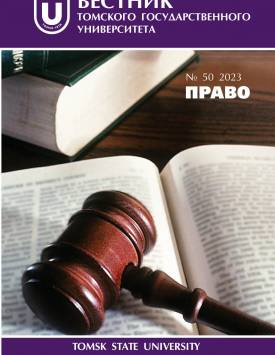Novelties in the delimitation of competences of the German federation
In the Federal Republic of Germany, by 2003 there was a need to reform federal relations. This is due to the fact that the existing division of legislative competence between the Federation and the Lander was leading to a legislative crisis. Thus, approximately sixty per cent of all federal laws were subject to the approval of the Bundesrat. Whereas in 1949 only ten per cent of all laws required Bundesrat approval, the gradual strengthening of the Lander's position through the Bundesrat brought the number up to sixty per cent by 1998. The aim of the constitutional reform of German federalism was therefore to improve the division of legislative competence between the Federation and the Lander and to reduce the number of cases in which the approval of the Bundesrat is required. The concept of federalism reform was based on the idea of introducing an adversarial principle between the Lander. This would complement the "co-operative" German federalism with the principle of competition. In addition, there was also an urgent need for reform with regard to the further integration of the German federal state into a united Europe, which was intended to make the federalism of the Federal Republic of Germany more "European-friendly". As a result, in March 2006 a draft law on federalism reform was submitted to the Bundestag and Bundesrat for discussion. The Federal Parliament adopted the Act on Amendments to the Basic Law of the Federal Republic of Germany, which was signed by the Federal President of the Federal Republic of Germany on 28 August 2006. It is worth noting that in the process of development of any federal state there is always a natural tendency towards centralisation of this state. The German federation in its development had a similar tendency towards centralisation. It can be concluded from this that it is necessary to regularly check the division of competences between the federation and its subjects to see whether the constitution actually in force today corresponds to the intentions of its creators. In the German federal reform process of 2006, structural changes were made to the division of competences between the Federation and the Lander in the field of legislation. Article 72 of the Basic Law of the Federal Republic of Germany was supplemented in 2006 by a new provision according to which the German states have acquired the right to adopt laws deviating from federal laws in certain areas. The Lander now have the "right of deviation". At the same time, a time limit of six months has been set for the Lander to react to the new federal legislation with an updated deviation. However, the relevant issue has not been removed from the federal competence, because in the territory of the Lander, if their laws diverge from the federal laws, the laws that were adopted later apply. In addition, as part of the reform of the federal structure of Germany, the framework legislation of the Federation (previously enshrined in Article 75 of the Basic Law) has been abolished. Its place now belongs to the exclusive or competing legislation of the Federation or is governed by the legislation of the Lander. Therefore, the Act of 28 August 2006 amended Article 73 of the Basic Law of the Federal Republic of Germany, which defines issues of the exclusive legislative competence of the Federation. Thus, the constitutional and legal process of reforming German federalism in the modern period indicates that the system of federal relations in Germany is constantly developing. The improvement of the federal form of state structure is a guarantee of democratic development, as well as the stability of complex states. The author declares no conflicts of interests.
Keywords
cooperative federalism, principle of delimitation of subjects of competence, Basic Law of the Federal Republic of Germany, Bundesrat, constitutional reformAuthors
| Name | Organization | |
| Geymbukh Nadezhda G. | Tomsk State University | nadgeym@mail.ru |
References

Novelties in the delimitation of competences of the German federation | Tomsk State University Journal of Law. 2023. № 50. DOI: 10.17223/22253513/50/3
